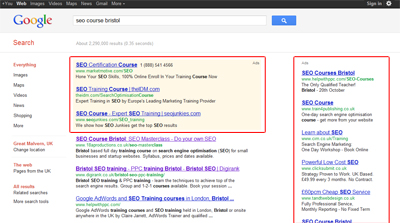What is PPC?
Pay Per Click (PPC) or Paid Search is when you pay a search engine to place you in a prominent position in search results.
This is generally shown by the results having a slightly different background colour, or being listed down the side. In the screenshot below, the red boxes indicate the listings which have paid to be there. This screenshot shows results on the search engine Google, and Google’s name for it’s PPC ads/Paid Search is “Google Adwords”. (Please note, this is different to Google Adsense, which is where people with websites are paid by Google for displaying ads – the names are similar and both relate to Google’s ad network but the actual services are polar opposites.)

PPC often works as an auction where one of the key criteria is that you say what you are willing to pay for a click on your ad, and whoever is willing to pay the most appears at the top. The search engine will make suggestions as to what you need to pay to stand a chance of being seen, so it’s not a blind auction. Other criteria are how suitable the text of your ad is, and if the page it links to (your “landing page” – the page people will land on when they click the ad) is relevant.
Of course, as soon as you stop paying, your ad is removed. Which is different to SEO, where you build up a presence which should last at least a little while longer than your SEO work if for any reason you had to stop.
Lots of companies provide PPC services where they can help you make the most out of your PPC campaign, either helping you get set up with suitable ad text or landing pages, or even running the full campaign for you and monitoring it. Whilst this page explains the basics of what PPC is, a lot can be learned to really get the best out of your campaigns and I’ve known companies successfully get a marketing employee to spend time learning the best practices, and I’ve known companies successfully employee an external expert to hit the ground running so it depends on your situation as to how you approach Paid Search.
Something to be wary of though, is when cold-callers ring you and say they can get you to the top of search engine listings in a very short time – do they mean organic listings or do they mean paid search? If they mean paid search then that means they’re going to be bidding in the auction on your behalf. And if they stop bidding/you stop using their services, you’ll be gone. It also means that what you pay them should vary depending on what they bid for you. Their hourly rate or monthly management fee won’t vary but the amount they bid for you in PPC and what they pay for someone else will be different so if they do a fixed rate service it either means they know that across the board their expenditure for their clients evens out, or they’re not really going to be too detailed with your bids. As with all things in life, there are reputable companies who will do a good job, and there are others who will just do the minimum they need to to tick some boxes.
With PPC of course, your conversion rates are vital. You don’t want to pay for someone to visit your site, and then the pages are such a mess that they can’t find what they’re looking for so they leave – you’ve paid for that lead and you wasted it! Similarly you don’t want to pay for people just to find that what they came for is out of stock or not currently available. I was in a talk once and someone asked the speaker how they could improve their presence in search engines because they were getting thousands of visitors a day but no business – the response was that they need to look at their website! If you’re paying for people to come to your site and you’re writing the ads that they click on to get there, and still they’re not buying – something somewhere isn’t right.
You’ve got to do the maths – if 1 in x visitors places an order of £xx and each click costs you x pence then does it add up?
Similarly you need to be sure that PPC suits your business model. Are people going to be in a buying mood when they click on your ad? I once spoke to someone who runs a CV writing service and he was saying that PPC is a tricky area in his field because of course you get lots of clicks from people just looking for help and advice rather than actually looking to buy. So whilst the maths can really work for some business models, others have to be more cautious and you have to make sure your site is going to make the best use of every lead you send its way.
We'd love to hear how we could make all this content easier for you to digest and use. Please give us any feedback you've got from using the site.
The Knowledge Base
Our knowledge base is split into categories, with an introdution to various differnt aspects of that category, followed by current topical articles which we constantly add.

